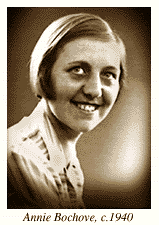HENNY JULIARD TELLS HER STORY, Part Two
HENNY JULIARD: From August 1942 until May 1945, we lived under the care of the Bochoves, both in hope and despair. We were thankful for the shelter, but depressed knowing that our presence was putting our best friends in deadly danger. And then too, we were always thinking about our family, wondering what had happened to them. Of course we didn't know any of the things we know now, but we recognized that we were all in danger. We were very lucky to have had the Bochoves, that in spite of everything, they somehow managed to help us live a rather normal life.
We weren't always in their home. From time to time the police warned us that the house was under suspicion, and then we went to another address for awhile.
The Bochoves were exceptional. Bert was an even-tempered man, always kind, liked by everyone. Annie was introverted, but easy to talk with; she was kind, and soft-spoken.
 One time Annie and I went out on our bicycles to a farmer the Bochoves knew. It was snowing, and the tires on the bicycles were bad; we had to stop every few kilometers to fix them. Usually we traded whatever we had for food--even my husband's shirts--but this particular farmer was not like most of them; he wouldn't take anything. We tied the bags he gave us to a cart pulled by Annie's bicycle, and pushed the bicycles home. We were gone for three days, but we got a lot of food: potatoes, grain, all kinds of things.
One time Annie and I went out on our bicycles to a farmer the Bochoves knew. It was snowing, and the tires on the bicycles were bad; we had to stop every few kilometers to fix them. Usually we traded whatever we had for food--even my husband's shirts--but this particular farmer was not like most of them; he wouldn't take anything. We tied the bags he gave us to a cart pulled by Annie's bicycle, and pushed the bicycles home. We were gone for three days, but we got a lot of food: potatoes, grain, all kinds of things.
Annie always did what she thought was right, but she made a bad mistake that year, going on another trip like that one. In September or October, she had seen her doctor for a lung examination. She explained to him what her home life was like--having all the people there. She could talk to him about these things because the doctors were very good about being against the Nazis. This was after
Arnhem
, and everyone thought the war would end soon. The doctor said to her, "If the war is over in a few weeks, what you are doing is all right. But if it lasts much longer, you must send the people away. It's too much for you. You can't take it." But she didn't follow his advice. The winter was long and there was very little to eat. She made a second journey to a distant farm, this time with another woman friend. By then she was pregnant with her second child, but she didn't tell anybody; she wanted to make the trip.
She didn't listen to anyone's advice, and she never complained about anything. Not long after the war ended she became ill again with her lungs and was sent to Switzerland. She came back in 1947, and died two years later.
Return to the:
 One time Annie and I went out on our bicycles to a farmer the Bochoves knew. It was snowing, and the tires on the bicycles were bad; we had to stop every few kilometers to fix them. Usually we traded whatever we had for food--even my husband's shirts--but this particular farmer was not like most of them; he wouldn't take anything. We tied the bags he gave us to a cart pulled by Annie's bicycle, and pushed the bicycles home. We were gone for three days, but we got a lot of food: potatoes, grain, all kinds of things.
One time Annie and I went out on our bicycles to a farmer the Bochoves knew. It was snowing, and the tires on the bicycles were bad; we had to stop every few kilometers to fix them. Usually we traded whatever we had for food--even my husband's shirts--but this particular farmer was not like most of them; he wouldn't take anything. We tied the bags he gave us to a cart pulled by Annie's bicycle, and pushed the bicycles home. We were gone for three days, but we got a lot of food: potatoes, grain, all kinds of things.